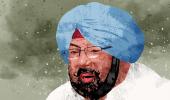Unemployment, delivery of justice in desecration cases, illegal sand mining and drug menace are likely to be key issues in the Punjab assembly elections.

The Aam Aadmi Party has emerged as a major contender and several farmers bodies too have thrown their hat in the ring as the strife-torn ruling Congress is struggling to put up a united face.
The Shiromani Akali Dal this time forged an alliance with the Bahujan Samaj Party after it parted ways with the Bharatiya Janata Party over farm laws.
The BJP has stitched an alliance with the Sukhdev Singh Dhindsa-led Shiromani Akali Dal (Sanyukt) and the Punjab Lok Congress, led by Amarinder Singh, who quit the Congress following his unceremonious exit as the chief minister last year.
The state will vote on February 14 and the counting will take place on March 10.
Opposition parties in Punjab have been slamming the state government over previous poll promises and repeatedly targeted it over unemployment.
The Congress faced criticism for not regularising services of contractual and temporary employees in various departments.
Chief Minister Charanjit Singh Channi had even threatened to stage a sit-in against Governor Banwarilal Purohit for withholding his assent to a bill for regularising services of 36,000 contractual employees.
Delivery of justice in cases linked to the desecration of the Guru Granth Sahib and police firing at those protesting against it is another issue.
Punjab Congress chief Navjot Singh Sidhu has been demanding justice in the cases and had launched a relentless tirade against former CM Amarinder Singh.
Drug menace, illegal sand mining and rising state's debt are other key issues finding resonance in the elections.
SAD leader Bikram Singh Majithia was recently booked in a drug case. However, he is yet to be arrested, for which the state government has been criticised by AAP.
With the entry of many players in Punjab's electoral landscape, a very thin margin can change the prospects of candidates this time.
With no discernible wave in favour of any party, all political outfits are making claims of forming the next government in Punjab.
AAP is expected to declare is CM face in coming days while the Congress is likely not to project anyone.
The ruling Congress had made Amarinder Singh resign last year to ward off anti-incumbency and end the internal rift. It appointed Charanjit Singh Channi as the CM, the first chief minister belonging to the SC community.
However, the internal strife in the party is still visible with state COngress chief Navjot Singh Sidhu often taking swipes at his own party government.
It also did not go down well with some party leaders after Sidhu backed some ticket aspirants during rallies.
Congress leaders, however, exude confidence that they will retain power.
On the other hand, AAP leader Raghav Chadha claims, "There is a wave for change in the whole of Punjab. I am fully confident that on February 14, on Valentine's day, the whole Punjab will say in one voice, "I love you Kejriwal', and people will give a chance to AAP to serve them".
Similarly, Shiromani Akali Dal chief Sukhbir Singh Badal said, "People of the state are ready and eagerly looking forward to a strong, stable and development oriented SAD-BSP government, committed to peace and communal harmony."
Former Punjab chief minister Amarinder Singh said, "We are all set for the Big Day that will decide the future of Punjab."
The Shiromani Akali Dal, which ended its 24-year-old ties with the BJP, is looking to revive its political fortunes.
The SAD last year tied up with the Bahujan Samaj Party with a hope of influencing votes of the Scheduled Castes community. Punjab has nearly 32 per cent SC population.
The Aam Aadmi Party, which is heavily banking on Arvind Kejriwal's Delhi model of governance, will be looking to form the government this time after facing drubbing in the 2017 Assembly polls.
Kejriwal, who has been leading the party's poll campaign, has tried to woo voters by promising several 'guarantees,' including 300 units of free power and Rs 1,000 per month to every woman while laying emphasis on improving the condition of government schools and hospitals.
The BJP, which used to contest on 23 seats, is hopeful of making its presence felt in the elections, especially after facing the wrath of the farming community over the three farm laws.
It will be banking on its traditional urban vote bank in the state.










